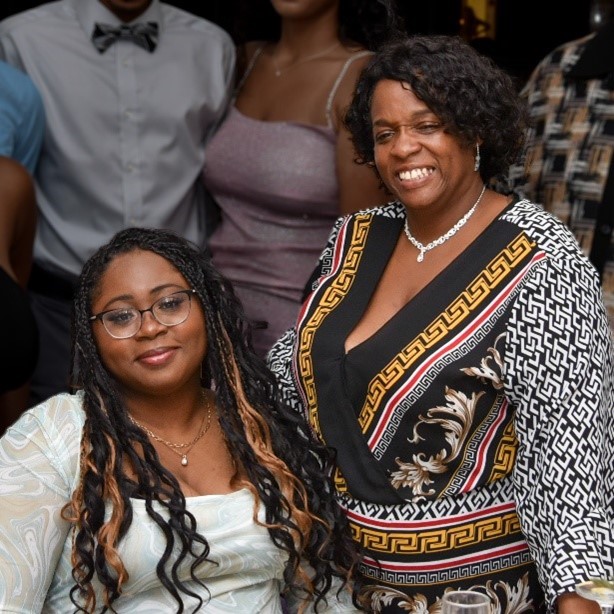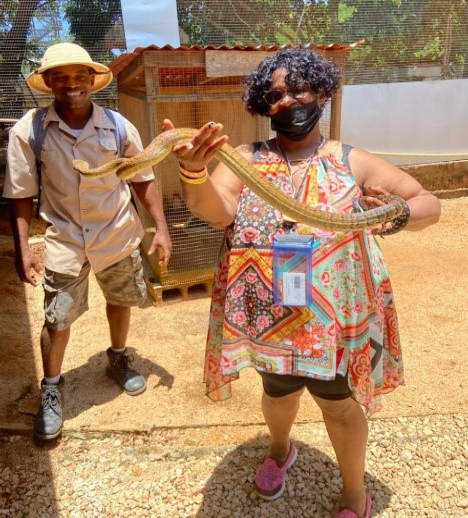Marrying Theory and Practice
Marrying Theory and Practice through Hands-on Education
Thursday, November 17, 2022
by Laurynn Scurlock

Ever since I was a young girl I have always been curious. That curiosity was fostered by my mother (pictured right), a lifelong science educator and champion for constructivist education in schools. It is to her that I owe my affinity for learning and my willingness to explore the unknown. My childhood was littered with books, documentaries, and long conversations of “Why?”. But what truly impacted me the most was my mother’s commitment to hands-on learning. She taught me to learn about the world through garden experiments and kitchen science. When Ebola scares plastered news headlines, she shared the research and first-hand accounts of what the virus does in a way that I could understand. In a sense, my mother facilitated the marriage between theory, education, science, and the “real world” in my mind.

I’m twenty years old now, and long gone are the pH experiments with cabbage juice and pool water. I’m a senior in college, a social work major, and one step from the rest of my life. Nevertheless, my mother’s lessons are still with me. After growing in my studies, I now understand that my mother’s educational philosophy is rooted in constructivist theory. Constructivism is an educational philosophy that acknowledges the complexity of the learner. Students possess past information and experiences and therefore "construct" new information by drawing from their experiences to learn. In her classroom function, she engaged students learning about genetics by connecting it to family planning, or nutrition for biochemistry. At home it was through cooking, gardening, and crafting that I learned science.
Today, I am a part of a program where constructivist philosophy and hands-on learning is the foundation of our curriculum. Every class we apply theoretical concepts to real world problems. We are trained to be critical thinkers, problem-solvers, and innovators in the world around us. Participation is encouraged, and students are expected to take charge of their educational journey.
Experiential learning, field education, constructivism… these concepts have their distinctions, but the philosophy is the same. Theory and practical education do not have to be isolated schools of thought. One feeds into the other; and when properly combined, they create a lovely marriage of integrated learning. When students receive both, they develop critical thinking skills, work experience, and creativity that can be applied to any future profession.
For example, in my social work major, there are multiple avenues for hands-on learning. Students not only are required to complete a year-long internship, called a practicum, in a real social service agency or not-for-profit, but we also must participate in macro-level change through a capstone project that addresses a real need in our surrounding community. During these opportunities we apply the knowledge gained from our many discussions, role-plays, and training to real world situations. During my practicum, I am able to work with youth involved in and transitioning out of the child welfare system. Additionally, my capstone pairs underrepresented college students with organizations, non-profits, and agencies with staffing shortages. This not only gives students valuable work experience prior to entering the workforce but also enables social service organizations to make changes in their communities.
The Social Work Program’s commitment to hands-on learning is equipping me to be a lifelong leader, changemaker, and service provider. My mother equipped me with a love of learning and constructivist education. In the future, I hope to marry this passion with my skills and experience to open my own school for at-risk students. Whether a student has aged out of the child welfare system, lives in a high poverty area, or has been a victim of violence, I believe that all students deserve to learn and to learn well. Children do not get a chance to choose their families, but they can choose their future if equipped with the proper tools and support.
Laurynn Scurlock is the Experiential Learning Programs Intern within the Office of University Experiential Learning at the University of Georgia. Laurynn is a senior in the Social Work Program at UGA. Stay up to date on all of UGA’s Experiential Learning programs at el.uga.edu and follow us on Instagram.